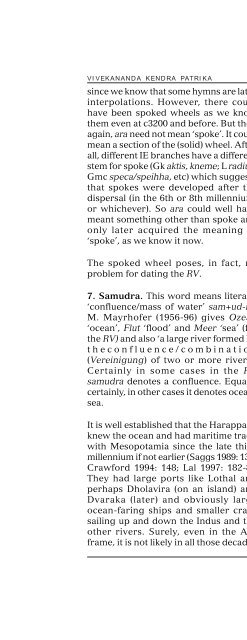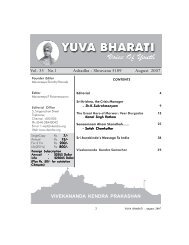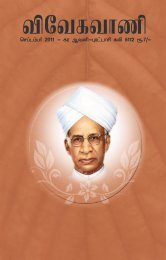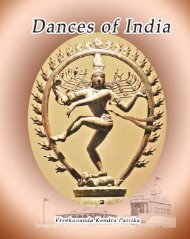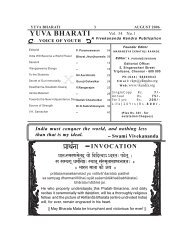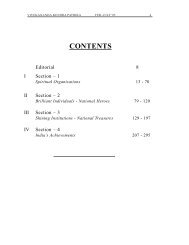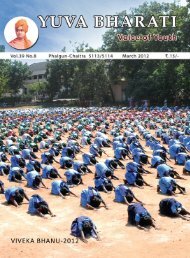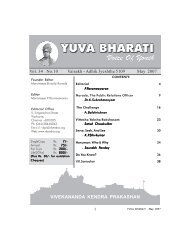Aryan Invasion Theory - Publication - Vivekananda Kendra
Aryan Invasion Theory - Publication - Vivekananda Kendra
Aryan Invasion Theory - Publication - Vivekananda Kendra
Create successful ePaper yourself
Turn your PDF publications into a flip-book with our unique Google optimized e-Paper software.
VIVEKANANDA KENDRA PATRIKA<br />
since we know that some hymns are later<br />
interpolations. However, there could<br />
have been spoked wheels as we know<br />
them even at c3200 and before. But then<br />
again, ara need not mean ‘spoke’. It could<br />
mean a section of the (solid) wheel. After<br />
all, different IE branches have a different<br />
stem for spoke (Gk aktis, kneme; L radius;<br />
Gmc speca/speihha, etc) which suggests<br />
that spokes were developed after the<br />
dispersal (in the 6th or 8th millennium,<br />
or whichever). So ara could well have<br />
meant something other than spoke and<br />
only later acquired the meaning of<br />
‘spoke’, as we know it now.<br />
The spoked wheel poses, in fact, no<br />
problem for dating the RV.<br />
7. Samudra. This word means literally<br />
‘confluence/mass of water’ sam+ud-ra.<br />
M. Mayrhofer (1956-96) gives Ozean<br />
‘ocean’, Flut ‘flood’ and Meer ‘sea’ (fot<br />
the RV) and also ‘a large river formed by<br />
theconfluence/combination<br />
(Vereinigung) of two or more rivers’.<br />
Certainly in some cases in the RV<br />
samudra denotes a confluence. Equally<br />
certainly, in other cases it denotes ocean/<br />
sea.<br />
It is well established that the Harappans<br />
knew the ocean and had maritime trade<br />
with Mesopotamia since the late third<br />
millennium if not earlier (Saggs 1989: 130;<br />
Crawford 1994: 148; Lal 1997: 182-8).<br />
They had large ports like Lothal and<br />
perhaps Dholavira (on an island) and<br />
Dvaraka (later) and obviously large<br />
ocean-faring ships and smaller craft,<br />
sailing up and down the Indus and the<br />
other rivers. Surely, even in the AIT<br />
frame, it is not likely in all those decades<br />
130<br />
ARYAN INVASION THEORY<br />
and centuries that the <strong>Aryan</strong>s never<br />
heard from the natives about the expanse<br />
of the ocean in the south and the former<br />
trade. Then, the <strong>Aryan</strong>s themselves were<br />
intrepid adventurers who had trekked<br />
100s of miles over rough and dangerous<br />
regions and had conquered the<br />
Saptasindhu. Surely it is not likely that<br />
nobody thought of travelling by chariot<br />
to the south, or by boat down the Indus<br />
and so gain first-hand knowledge of the<br />
ocean. And if a few did this, then more<br />
would follow and, in any case,<br />
knowledge of the ocean would spread<br />
among the Indoaryans, including some<br />
of the composers of the hymns.<br />
Thus common sense compels us to<br />
accept that the Indoaryans had<br />
knowledge of the ocean/sea even in the<br />
AIT scenario. With its customary caution<br />
the Vedic Index, which does not at all<br />
promote indigenism or an early Rigveda,<br />
but adheres to the AIT, states “knowledge<br />
of the ocean… was almost inevitable to<br />
people who knew the Indus” (vol 2, 432).<br />
Why modern scholars abandon common<br />
sense is a mystery.<br />
We should note that the recent claims<br />
about samudra denoting various watermasses<br />
other than the ocean are not new<br />
nor more “scientific”. The Vedic Index<br />
(1912) mentions some scholars who<br />
rejected totally the meaning ‘ocean’,<br />
others who accepted it in few and others<br />
in many cases. It cites Zimmer who<br />
thought samudra “denotes the river<br />
Indus when it receives all its Panjab<br />
tributaries” and gives numerous<br />
references (see example no 10, end). But<br />
it adds “even Zimmer who is inclined to<br />
restrict [the Vedic Indians’] knowledge


